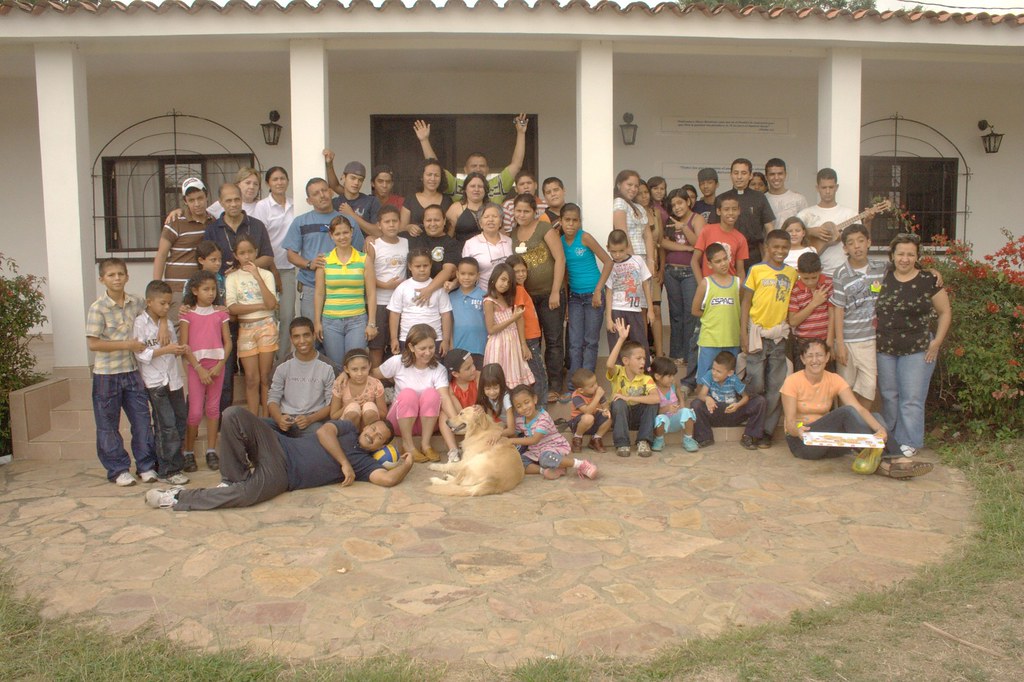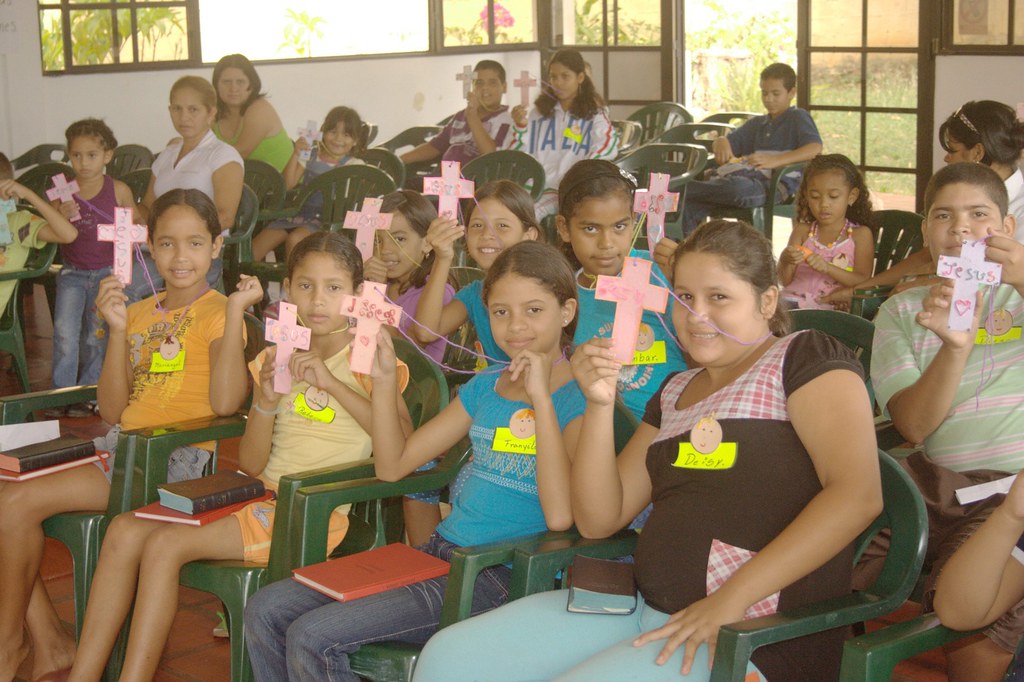The chorus of "This Magic Moment", another classic ballad, features a variation on the phrase. The singer recalls the first kiss with his beloved as being "sweeter than wine, softer than a summer's night." "This Magic Moment" was originally released by the Drifters in 1960 and later by Jay and the Americans, Diana Ross and Marvin Gaye, among others.
Who knows whether the writers of these American pop standards were consciously borrowing from the Bible, but it's hard not to hear an echo of the Song of Songs (also known as the Song of Solomon), verse 2: "Let him kiss me with the kisses of his mouth! For your love is better than wine." Verse 1 is the book's title: "The Song of Songs, which is Solomon's."
I opened our discussion of courtship and marriage for the youth with a meditation on the Song of Songs. Luz Maria got the idea for a series of such discussions after hearing rumors of many pregnant sixth-graders this year and learning that as of 2010, Venezuela has the highest rate of teenage pregnancies in Latin America, although teen pregnancies are increasing throughout the region.
The Song of Songs seemed appropriate to me, even though explaining its message in a simple manner posed a challenge. Franz Delitzsch, a German Lutheran scholar and theologian of Jewish descent, called it "the most obscure book in the Old Testament" and, in some ways it is. This is primarily because the Song of Songs is a lengthy poem consisting almost entirely of dialogue. The problem is that the text offers very few clues as to who is talking and when. It is as if the book of Job started right in with the debate over why the righteous suffer with no framing narrative about who Job was or what kind of predicament he was in, and with no phrases like, "Then Job said..." or "Then Elihu said..." or "Then the Lord spoke..." This has led to an abundance of speculation, much of it rather fanciful, about how many "voices" there are in the poem, who is speaking, and the details of the underlying narrative.
 Image via Wikipedia
Image via WikipediaThe Song of Songs is frankly sensual in its language. The writer is keenly attuned to colors, sounds, smells, textures and tastes. He (the first verse would indicate that Solomon himself wrote it) is deeply appreciative of the beauty of the human form as well as the corresponding beauties of nature and the landscapes of Palestine. Thus the Song of Songs may be read as an affirmation of the goodness of God's creation and of romantic love and marriage, and a corrective to the many Old Testament warnings against the temptations of the flesh.
But there is more to it than that. Since ancient times the Song of Songs has been interpreted a symbolic representation of the relationship between the Lord and His people. The traditional Jewish interpretation is that the Song of Songs is a picture of the history of Israel beginning with the Exodus, which is why to this day the Song of Songs is read in synagogues during Passover. Later Cbristian commentators would see the Shulamite as a symbol of the Church and her kingly bridegroom as Christ.
How is this connection made? The moral of the story in Song of Songs is that commitment plus fidelity equals a lasting relationship characterized by joy, contentment and complete trust in the beloved. This principle may not only be applied to the most intimate of human relationships, but also to relationship between God and His people. Hosea 2:16.20 makes this clear:
“And in that day, declares the LORD, you will call me ‘My Husband"...and I will betroth you to me forever. I will betroth you to me in righteousness and in justice, in steadfast love and in mercy. I will betroth you to me in faithfulness. And you shall know the LORD."
And again in Isaiah 54:5
"For your Maker is your husband, the LORD of hosts is His name; and the Holy One of Israel is your Redeemer, the God of the whole earth He is called."
On the negative side, not only does the Old Testament condemn the sexual immorality and perversion of the pagan world, but idolatry in itself is considered adultery. Jeremiah 3:1 says this: "You have played the whore with many lovers; and would you return to me? declares the LORD."
Given this theme of fidelity, it might seem inconsistent to identify the Shulamite's suitor as Solomon, since the historical books of the Old Testament tell of the king's many wives and concubines, and his eventual fall into idolatry. But not if Solomon is seen in a prophetic fashion as prefiguring another son of David who would bring justice and mercy to His people. In fact, Solomon is portrayed as a messianic figure in 2 Samuel 7:12–17, Psalm 72 and also in Matthew 12:42.
In the New Testament, St. Paul writes to the church in Corinth in 2 Corinthians 11:2-3, "I feel a divine jealousy for you, for I betrothed you to one husband, to present you as a pure virgin to Christ. But I am afraid that as the serpent deceived Eve by his cunning, your thoughts will be led astray from a sincere and pure devotion to Christ."
And in Ephesians 5:22-32, "Wives, submit to your own husbands, as to the Lord.For the husband is the head of the wife even as Christ is the head of the church, his body, and is himself its Savior. Now as the church submits to Christ, so also wives should submit in everything to their husbands. Husbands, love your wives, as Christ loved the church and gave himself up for her,that he might sanctify her, having cleansed her by the washing of water with the word, so that he might present the church to himself in splendor, without spot or wrinkle or any such thing, that she might be holy and without blemish. In the same way husbands should love their wives as their own bodies. He who loves his wife loves himself. For no one ever hated his own flesh, but nourishes and cherishes it, just as Christ does the church, because we are members of his body. Therefore a man shall leave his father and mother and hold fast to his wife, and the two shall become one flesh. This mystery is profound, and I am saying that it refers to Christ and the church."
Finally in Revelation 19:7-9, there is the triumphant vision of Christ, the Lamb of God, His bride, the Church, and the eternal wedding-feast:
"Let us rejoice and exult and give him the glory, for the marriage of the Lamb has come, and his Bride has made herself ready...And the angel said to me, “Write this: Blessed are those who are invited to the marriage supper of the Lamb.” And he said to me, “These are the true words of God.”
In conveying these ideas to the youth, it helped to point out how the Song of Solomon was the source of words and images in some of their favorite songs. For example, Song of Songs 2.4 says, "He brought me to the banqueting house, and his banner over me was love," while in chapter 6, verse 3, we read, "I am my beloved's and my beloved is mine." One of the songs that the children and youth really like to sing is called "Su Bandera sobre mi es amor" (His banner over me is love) and the first stanza is "I am Christ's and Christ is mine; His banner over me is love."
Likewise, in Song of Songs 2:1 we read, "I am the rose of Sharon; I am the lily of the valley." So in the song, "Cristo es la Peña de Horeb" (Christ is the Rock of Horeb), the second stanza goes, "Cristo es el lirio del valle de los flores, la Rosa pura y blanca de Sarón."
After the opening meditation and prayer, Luz Maria led the group in a discussion of what physical changes they could expect as they entered adolescence. and how that might affect their emotional, intellectual and social development. She talked about some of the immediate consequences of early pregnancy and the risk of sexually transmitted diseases, as well as the long-term consequences of becoming sexually active too soon and outside the bounds of matrimony.
Luz Maria says that, based on the discussion so far, the youth have inadequate knowledge of basic facts of life, despite having an idea of what condoms and birth control pills are. However, their families have responded favorably and we will have at least one more session.















